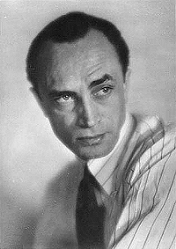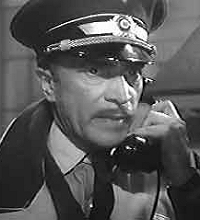 Conrad Veidt (1893-1943), perhaps best known today for his supporting role as Major Strasser in Casablanca (1942), was a front-rank talent deserving a thorough biographical reappraisal. Veidt was a talented, expressive, physically imposing performer capable of some wonderful things; witness his performance as Jaffar, the evil magician in Alexander Korda's Technicolor fantasy The Thief of Bagdad (1940). Veidt could improve a film, even a mediocre one, simply by appearing in it.
Conrad Veidt (1893-1943), perhaps best known today for his supporting role as Major Strasser in Casablanca (1942), was a front-rank talent deserving a thorough biographical reappraisal. Veidt was a talented, expressive, physically imposing performer capable of some wonderful things; witness his performance as Jaffar, the evil magician in Alexander Korda's Technicolor fantasy The Thief of Bagdad (1940). Veidt could improve a film, even a mediocre one, simply by appearing in it.
Before 1914, Veidt studied and performed with the Max Reinhardt company, serving in the German army during World War I. As a result of illness, the military reassigned him to duty in Berlin in 1916; his film debut was in The Spy (Der Spion) in 1917. His role as Cesare in The Cabinet of Dr. Caligari two years later focused international attention on him, and in 1920 he formed his own production company, starring in and sometimes directing his own films. Veidt became a British citizen in 1938; he worked in both England and America, fleeing Germany after the Nazis harassed him because his wife was Jewish.
--ROY KINNARD, from Horror in
Silent Films, 1995
Conrad Veidt was probably tired of being nasty by the time he was cast as Major Strasser in Casablanca (1942). Including Casablanca, Veidt played Nazis in three movies that reached theaters in 1942. In MGM's Nazi Agent he not only played the evil Nazi spy but his loyal-to-America twin brother. And in Warners' All Through the Night, he loaded a speedboat with explosives and drove it at a battleship in New York harbor but was foiled by Humphrey Bogart.
 Born in Berlin in 1893, Conrad Veidt had started out as the hero, not the villain. Exceptionally handsome, he had become a star overnight in 1919 as the sleepwalker in The Cabinet of Dr. Caligari. In 1926, John Barrymore insisted that Veidt come to Hollywood to costar with him in The Beloved Rogue. Veidt was under contract to Universal for two years at $1,500 a week before the innovation of talking films and his imperfect English sent him back to Germany in 1929. He chose to leave despite his huge success a year earlier as the tragic clown whose face is twisted into a perpetual smile in The Man Who Laughed (1928).
Born in Berlin in 1893, Conrad Veidt had started out as the hero, not the villain. Exceptionally handsome, he had become a star overnight in 1919 as the sleepwalker in The Cabinet of Dr. Caligari. In 1926, John Barrymore insisted that Veidt come to Hollywood to costar with him in The Beloved Rogue. Veidt was under contract to Universal for two years at $1,500 a week before the innovation of talking films and his imperfect English sent him back to Germany in 1929. He chose to leave despite his huge success a year earlier as the tragic clown whose face is twisted into a perpetual smile in The Man Who Laughed (1928).
Veidt was not Jewish, but his second wife, Lily, was. They married in 1933 and left immediately for England. "Veidt would never have moved away from his adored daughter, Viola, unless it was absolutely necessary," says Patricia Battle, who is writing a biography of the actor. "But he made sure his daughter and his first wife were safe in Switzerland before the war began. There is a story--which may not be true--that when Veidt left Germany for good and had to fill in a form asking religious affiliation, he wrote 'JEW.'"
Veidt became a British citizen in 1938. By that time he was playing villains like the Grand Vizier in Alexander Korda's The Thief of Bagdad. When war came, he loaned the money he had in the bank to the British government. After he came to America in 1940, he donated most of his slary from his American films to the British War Relief. He was, after all, only forty-nine years old, under contract to MGM, with years of good movies ahead of him. But he would be the first of the major participants in Casablanca to die. He dropped dead on a golf course less than a year later.
--ALJEAN HARMETZ, from The Making Of
Casablanca, 1992